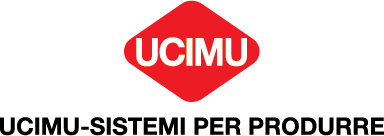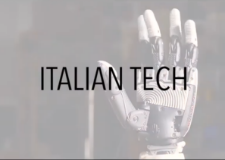The year 2021 was extremely positive for the Italian industry of machine tools, robotics and automation, which reported double-digit increases for all key economic indicators. This trend should continue even in 2022, the year when all the ground lost in 2020 should be recovered.
This is in short what was illustrated by Barbara Colombo, president of UCIMU-SISTEMI PER PRODURRE, the Italian machine tools, robots and automation systems manufacturers' association, during the traditional end-of-year press conference.
As highlighted by the preliminary year’s data processed by the Studies Dept. & Business Culture of UCIMU-SISTEMI PER PRODURRE, in 2021 production reached 6,325 million euro, marking a 22.1% upturn compared with the previous year.
The outcome was due to the excellent trend of Italian manufacturers’ deliveries in the domestic market, increased by 27.8% to 2,965 million euro, as well as to the positive performance of exports, achieving 3,360 million euro, i.e. 17.4% more than in the previous year.
Based on the ISTAT data processing by UCIMU, in the period January-September 2021 (latest available data), Italian exports of machine tools only started to grow again in almost all countries of destination. Sales to Germany, which turned out to be the first country for the “Made in Italy” exports of the sector, went up to 256 million euro (+38.4%). The other major destination countries were the United States, 251 million euro (+9.7%), China, 154 million euro (-5.3%), Poland, 118 million euro (+29%) and France, 117 million euro (+1.2%). The domestic market was extremely lively, as shown by the data of consumption, which increased by 30.4% in 2021 compared with the previous year, attaining a value of 4,645 million euro. The export/production ratio went down by two percentage points, standing at 53.1%. In line with the upswing reported by these indicators was also the growth of turnover, exceeding the value of 9 billion euro in 2021, after collapsing to 7.5 billion euro in 2020.
Despite the dynamic demand and the improvement in the context, in 2021 the Italian industry of the sector was not able to achieve a full recovery after the downturn experienced in 2020 because of the difficulty in sourcing components and raw materials. This phenomenon caused a delay between the collection of orders and the actual delivery of machinery.
In particular, according to the survey conducted last October by the UCIMU Economic Studies Department & Business Culture on a representative sample of enterprises in the sector, 95% of the companies said that there are late supplies. The average delay is 3 months, which, added to the usual one and a half months of normal waiting time, makes the delivery time of supplied components and materials increase to 4 and a half months. According to the interviewed enterprises, the impact of this delay on the delivery time of machinery is estimated at 4 months. As a result, the average delivery time of machinery is currently 9 months versus the 5 months, which manufacturers habitually used to guarantee their customers.
The positive trend reported in 2021 should continue even in 2022, the year when there should be a full recovery from the collapse due to the outbreak of the pandemic. In particular, according to the forecasts processed by the UCIMU Economic Studies Department & Business Culture, in 2022 production should grow to 7,015 million euro (+10.9% versus 2021), driven by the upswing of exports, which should attain 3,620 million euro (+7.7%) and by the upturn of manufacturers’ deliveries in the domestic market, which should rise to 3,395 million euro (+14.5%).
Consumption should also keep growing, reaching 5,205 million euro, corresponding to 12.1% more than in 2021. Even if to a reduced extent compared with manufacturers’ deliveries, imports should also benefit from the dynamism of domestic demand, marking a 7.7% rise (versus 2020), which should bring their value to 1,810 million euro. The export/production ratio should go down again, standing at 51.6%. The growth experienced in 2021 should also continue in 2022, as highlighted by the forecasts. This is also confirmed by the analysis of the Italian manufacturers’ order portfolio concerning the third quarter 2021 (latest available data), which achieved 7.6 months of guaranteed production, the highest value ever recorded over the last 30 years. [In the third quarter 2020, the indicator stood at 5.1 months].
Barbara Colombo, president of UCIMU-SISTEMI PER PRODURRE, commented: “The year 2021 was extremely positive for the Italian manufacturers of machine tools, robots and automation systems. Only the lack of some electrical and electronic components and of raw materials hindered the full recovery of the loss registered at the end of 2020, in conjunction with the outbreak of the pandemic”.
“On the other hand, we are still observing - continued Barbara Colombo – a wide discrepancy between the trend of the order collection and the turnover performance affected by the delayed delivery times of machinery due to the long waiting times for the supplies that we the manufacturers are facing. This said, in 2022, we will not only recover all the ground lost during the public health emergency, but we will be able to return to the record levels of 2018 for many indicators, because the market is really effervescent, especially the domestic one”.
“In particular, while experiencing a slower recovery of business on foreign markets owing to the restrictions still concerning the mobility of people, we instead notice a great liveliness of Italian demand supported, at least partially, by the Government incentives for new investments in production technology”.
“In this connection, we can affirm that the confirmation of the applicability of these measures at least until the whole year 2025 is surely good news, because the upgrading process and digital transformation of Italian factories is still in full progress and must be supported and incentivized. Considering the provisions currently included in the Budget Law 2022, under discussion over the last few weeks, we must point out several essential corrections that are necessary to ensure that the measures in the plan are really effective”.
“With reference to the tax credit for the investments in new technology 4.0 and others and taking into account the problem of the delayed delivery times due to the lack of components and raw materials, we asked for the postponement until December 2022 of the deadline for the delivery of goods ordered in 2021, now set for June 2022. In addition, while understanding the need for a reduction of tax rates, we ask to adopt a softer passage in order to allow a gradual withdrawal of incentives, now established in 2025”.
“Moreover – added the president of UCIMU, Barbara Colombo – we ask to postpone the tax credit for training and education 4.0, which is presently not included in the Budget Law 2022. Now more than ever, those who operate in the world of enterprises can understand the importance of professional education and training of employees, who must operate on state-of-the-art machines and technologies and in more complex contexts than in the past”.
“After all, in our opinion, the incentive measures for the replacement of obsolete machinery and for the digitalization of production plants should become structural, so that they can accompany Italian manufacturing enterprises – mainly family-run SMEs and thus with a limited willingness to invest – in a process of continuous updating”.
“The evidence of the benefit deriving from this operation is proven by the results of the survey on the Total Machine Tools installed in the Italian metal mechanical enterprises, carried out by UCIMU and presented last spring. The survey shows that not only has the number of acquired machines grown, but also the digitalization rate in the factories has increased, as measured by the number of CNC machines in operation. In particular - concluded Barbara Colombo – in the period 2015-2019, in conjunction with the plans for transition 4.0, 60,000 new machines entered the Italian factories, i.e. 50% more than the machinery acquired in the previous five-year period, corresponding to less than 40,000 units. In addition, in the last survey, 60% of the new machines turned out to be CNC machinery, versus 37% of the previous survey (2014)”.
Cinisello Balsamo, 14 December 2021
For more information, contact the following:
Claudia Mastrogiuseppe, External Relations and Press Office Manager, +390226255.299, +393482618701 press [at] ucimu.it
Massimo Civello, External Relations and Press Office +390226255.266, +393487812176 press2 [at] ucimu.it
Filippo Laonigro, Technical Press Office, +390226255.225, technical.press [at] ucimu.it



























